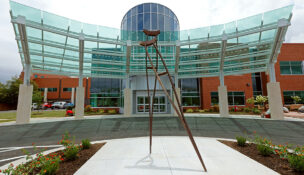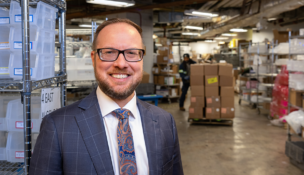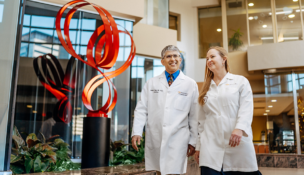Interview with an innovator
‘Being passionate is mission critical’
Virginia Business //April 29, 2019//
Interview with an innovator
‘Being passionate is mission critical’
Virginia Business //April 29, 2019//
Gary Warren is president and CEO of ivWatch, a company that develops technology to improve the safety of one of the most common invasive medical procedures: peripheral intravenous (IV) therapy.
While about 90% of hospitalized patients receive IV therapy, Warren says, the failure rate is as high as 50%. And the cause of failure in more than 20% of cases is a leak outside the intended vein into surrounding tissue.
The Hampton-based company’s ivWatch Model 400 is a noninvasive device cleared by the FDA to detect the leakage of a drug or fluid during therapy.
Virginia Business interviewed Warren via email to gain his perspective on what it took to develop a startup into a medical device manufacturer and biosensor technology company. Warren, who began his career as a research scientist in computational fluid dynamics at NASA Langley Research Center, says “there is no room for the ‘fake it till you make it’” mentality.
Virginia Business: What has helped ivWatch succeed?
Warren: Solving problems and developing products in the medical field is incredibly difficult. The one underlying requirement for success in this field is the relentless pursuit of solving an unmet need in health care. It is a desire to right a wrong and never giving up.
This goes for the scientists, engineers, business professionals, investors and, most importantly, an innovative medical institution that will allow access to patients, data and clinicians.
Being passionate is mission critical. The expectations are extremely high and scrutinized for a breakthrough technology. All of this is compounded for first-to-market innovations, as well as designing and documenting to a standard, so your team has to be hungry.
VB: Describe your technology.
Warren: ivWatch’s breakthrough technology monitors what is happening below the skin and into the tissue during drug/fluid delivery and can detect leakage within a few drops. It’s essentially “surveillance under the skin” with the ability to detect an event far before signs are visible to the human eye.
But we’re not stopping there. Biosensor development comes down to the science and depth of knowledge a company’s team has on interpreting and analyzing data. Right now, it’s about watching the IV, but we plan to leverage this technology and the amount of data we are able to collect and introduce new products using the IV site to watch a person’s overall health.
VB: How has ivWatch grown since it was launched?
Warren: Since ivWatch was founded in late 2010, we’ve grown from a small group doing nothing but research and development — essentially an incubator startup type of company — to a company of nearly 40, including marketing, sales, manufacturing and clinical departments. We are addressing a huge unmet need and building a new market within the medical/health-care space. We are a Hampton Roads company with an international reach.
VB: What was an early challenge?
Warren: The unique attributes of the medical-device industry require adherence to strict quality procedures and regular audits by governing agency bodies. It takes time to move from concept to commercialization, and the road was longer than anticipated.
We’ve conducted [tens of] thousands of monitoring hours through clinical trials and evaluations, been awarded patent grants across the globe and have secured steady funding to get to the stage where customers include world-class health facilities.
But in the beginning, we found out one very important thing — you can’t do testing on nonmobile objects for a technology that would be used on moving patients. One of our core, globally patented algorithms focuses on mitigating the effects of tissue blood volume changes during movement. It is an example of how we prospered where we almost failed.
VB: What’s on the horizon for your company?
Warren: Our growth plan consists of organically expanding our business through continued development of our direct sales team for the U.S. pediatric and adult acute-care market. We have also [formed partnerships] to expand our reach into international pediatric and adult markets.
A focus this year is bringing more manufacturing in-house and bringing more high-tech jobs to the area. We’re looking at our areas of expertise and vertically integrating those areas by producing some of our own product components.
l

















